New Non-Unanimity Law Creates Chaos in Remaining Cases
According to new research by the Death Penalty Information Center, 82% of Florida death-sentenced prisoners who completed new sentencing proceedings under Hurst v. Florida (2016) have been resentenced to life in prison without parole. Hurst found Florida’s death penalty scheme unconstitutional, and the Florida Supreme Court subsequently held that new death sentences must be unanimous, necessitating new sentencing hearings. Of the 157 cases DPIC previously identified as Hurst-eligible — anyone sentenced to death by a non-unanimous jury since 2002 — about two-thirds have been resolved and one-third remain. However, in April 2023, Governor Ron DeSantis signed a bill authorizing a new non-unanimous sentencing standard of 8 – 4 in capital cases. This new law has sown confusion as courts have differed on whether to apply the 8 – 4 standard to the remaining Hurst cases and defendants have challenged its application as unconstitutional.
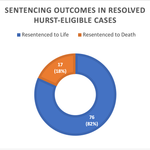
The high rate of life sentences in Hurst proceedings illustrates just how heavily Florida has historically relied on non-unanimous votes to secure death sentences. The Hurst-eligible prisoners with non-unanimous death sentences represented at least 40% of the state’s death row at the time of the Supreme Court’s decision, with even more Florida prisoners sentenced non-unanimously but not eligible for new sentencing hearings because their convictions became final before 2002. DPIC’s research shows that when Florida was required to obtain the unanimous votes of twelve jurors to reaffirm a death sentence in a prior non-unanimous case, four out of every five proceedings ended in a life sentence instead. Every other state except Alabama requires a unanimous jury vote for death.
One explanation for the high number of life sentences is the state’s decision to waive death for many of the Hurst-eligible prisoners. The cause of the waivers is “two-fold,” said Maria DeLiberato, Executive Director of Floridians for Alternatives to the Death Penalty. “In some cases prosecutors decided not to seek the death penalty because they didn’t feel they could get a unanimous death sentence, while in other cases they opted for finality over uncertainty.” Ms. DeLiberato noted one case in which an elderly surviving victim supported a life without parole sentence so that she did not have to spend the rest of her life participating in death penalty litigation. Ms. DeLiberato praised the victim’s “grace and courage” and predicted that such considerations would lead the state to waive death in other cases.
For the prisoners who underwent new sentencing hearings, the high percentage of life sentences suggests that they would not have received the death penalty if sentenced for the first time today. Death sentences have fallen over the past two decades as capital defense funding, training, prosecutorial accountability, legal protections for vulnerable groups, and public awareness of wrongful convictions have increased. Capital punishment lawyer and scholar Stephen Bright has termed these “zombie cases,” to characterize people who “almost certainly would not be sentenced to death today” but “remind us of just how unfair” the system once was.

Further, DPIC’s findings confirm academic research that suggests non-unanimous sentences obscure “residual doubt” and sympathy that would otherwise spare defendants from the death penalty. Three Florida men who had been sentenced to death by divided juries walked free in the years after Hurst: Clemente Aguirre-Jarquin and Ralph Wright were exonerated, while Jason Simpson pled guilty to lesser charges and was sentenced to time served (meeting DPIC’s criteria for partial exoneration). Four additional men sentenced non-unanimously would have been eligible for relief under Hurst had they not been exonerated before it was decided. A 2020 DPIC analysis found that 22 of 24 Florida exonerees for whom data was available (92%) were sentenced to death by non-unanimous juries; now with 30, Florida has long-held the distinction of having the country’s highest number of exonerees. The Editorial Board of the South Florida Sun Sentinel cited this fact in arguing against the application of the new 8 – 4 law in Hurst cases on December 19. “Florida’s nation-leading total of 30 death row exonerations shows that this state’s criminal justice system is too fallible to entrust it with manufacturing even more executions,” the editors wrote. The law “will inevitably pack death row with more people who don’t belong there.”
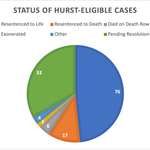
Duval County, home to the city of Jacksonville, is a microcosm of the chaos and inconsistent outcomes Hurst defendants have experienced since the 8 – 4 law went into effect in April. Michael James Jackson, Tiffany Cole, and Alan Wade were sentenced to death over 15 years ago as co-defendants in the 2005 murder of Reggie and Carol Sumner. The three along with another co-defendant were convicted of kidnapping, robbing, and burying the Sumners alive. All three had their sentences overturned in the wake of Hurst because their juries had not been unanimous.
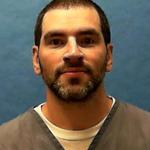
Mr. Wade’s new penalty phase was set first on the docket, for June 2022, under the unanimous standard. A jury resentenced him to life in prison after emotional mitigation testimony about Mr. Wade’s childhood sexual abuse, trauma, and youth at the time of the crime. However, based solely on administrative logistics, Mr. Jackson and Ms. Cole had their resentencing hearings set for the following year — which brought them under the purview of a much lower sentencing standard when the new law took effect in April 2023. A court ruled over defense objections that the 8 – 4 law applied to their cases. Only two jurors voted for the death penalty for Ms. Cole in August, sparing her, while Mr. Jackson was sentenced to death under the now-lowest sentencing standard in the country, the bare minimum: 8 – 4. The verdict means that one-third of the jurors who heard the evidence against Mr. Jackson believe he should not face execution.
According to Ms. DeLiberato, Mr. Jackson’s resentencing was delayed at least once because of a hurricane — the timing of which affected the sentencing standard in his case. “The Supreme Court in Furman told us the death penalty is unconstitutional when it is applied in an arbitrary and capricious manner — as random as a lightning strike,” she said. “And look what happened here, a man is facing execution because his trial was delayed by an act of nature.” She argued that applying a different legal standard to some Hurst defendants based on administrative timing represented “a marker of arbitrariness in the death penalty that on its own is violative of the Constitution.”
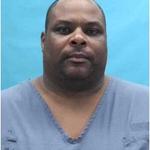
In September 2023, after litigating aggressively for the application of the 8 – 4 law in Mr. Jackson and Ms. Cole’s cases, and just one month after they were resentenced, Duval County prosecutors waived the death penalty for the resentencing of Galante Phillips. Mr. Phillips was originally sentenced to death by a vote of 7 – 5, the minimum required at the time, for the 2005 murder of a store employee during a robbery. Prosecutors did not offer an explanation for their decision — but the murder of the Sumners, for which Mr. Jackson and Ms. Cole faced resentencing, was extensively covered in the media and a much higher profile crime.
At the time the new sentencing law took effect, sixteen Duval Hurst cases had been resolved: eleven prisoners were resentenced to life, four to death, and one partially exonerated (Mr. Simpson). This breakdown — 25% resentenced to death and 75% to life or less — reflects the overall spread of Hurst outcomes across Florida. Since only nine of the 105 finalized Hurst cases were resolved since the passage of the new law, DPIC’s research findings largely capture the trends of the period during which Florida required unanimous sentences. Seven Duval Hurst prisoners await resentencing under a lower standard than the earlier sixteen.
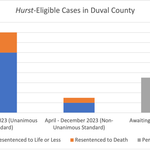
In Broward County, home to Fort Lauderdale, no Hurst-eligible prisoner has had to face the lower sentencing standard. Based on public records, prosecutors have waived death for at least three defendants — Charles L. Anderson, Alex Pagan, and Robert Rimmer — with another, Ronnie Lee Williams, to be resentenced to life on January 4. However, Broward County has sought to apply the 8 – 4 law to new capital defendants pending trial for crimes committed before it passed. Clarck Paul’s trial under the new law started just weeks after Governor DeSantis signed the bill. The jury voted for a life sentence after only 15 minutes of deliberation.
“Florida’s 2023 capital sentencing statute again threw Florida’s capital sentencing system into disarray” less than ten years after Hurst had already upended it, said Melanie Kalmanson of Tracking Florida’s Death Penalty, who has conducted extensive research into Hurst and its aftermath. Courts have ruled that the new law applies in at least nine pending Hurst cases. In Volusia County, Troy Victorino and Jerone Hunter had their Hurst sentencing hearings end in a mistrial when the law took effect in the middle of the proceedings; prosecutors then sought to apply the lower sentencing standard, and an appellate court agreed. The judge called the situation a “massive dumpster fire.” By contrast, a judge in three first-time trials in Polk County held that the new law would be an unconstitutional ex post facto law if applied to crimes committed before its passage.
Most of the Hurst-eligible prisoners facing the lower sentencing standard have challenged its application at the Florida Supreme Court. However, on December 14, the Court declined to rule on the issue in the case of Leonard Gonzalez, holding that he could only challenge the application of the law if he was retried again and sentenced to death. “The review he seeks must come at a later time, if at all,” the Court wrote, punting on the question of the law’s constitutionality. Three days later, the Court denied the petitions of Jason Looney and Renaldo McGirth, citing Gonzalez and authorizing the two men for upcoming trial dates as well.
“We’ve gone backwards,” said Ms. DeLiberato. She argued that Florida’s death penalty scheme is “eventually going to be overturned again” based on the Supreme Court’s clear directives to the state in Hurst. “The hundreds of victims in the cases going to trial now under the unconstitutional law are going to think that there was a death sentence, and then will get a phone call saying we’re doing this all over again.”
Ms. DeLiberato also emphasized that the “resurgence” of non-unanimity in Florida “does not mean that the attitudes of every day Floridians about the death penalty are any different than those nationwide. Individual Floridians, like the rest of the country, are trending away from the use of the death penalty.” She argued that the 8 – 4 law “seems to be more related to the life verdict in the Parkland shooter’s case, coupled with the Governor’s presidential aspirations.” Her goal is that “in 2024, the people of the state of Florida will urge their lawmakers to really take a hard and honest look at the costs, both emotional and financial, of Florida’s broken death penalty.”
The Sun Sentinel editors expressed similar concerns. “Prisoners could be put to death under a law that was passed after they committed their crimes,” they wrote. “That is not justice…Florida may spend millions of dollars trying and defending prisoners under the new law, only to have it all wasted if the high court eventually overturns the law, as it should.”
Editorial Board, A flawed law ensures a larger death row, South Florida Sun Sentinel, December 19, 2023; Melanie Kalmanson, Florida Supreme Court denies two other pending petitions, citing Gonzalez, Tracking Florida’s Death Penalty, December 17, 2023; Melanie Kalmanson, BREAKING: Florida Supreme Court denies Gonzalez petition related to application of 2023 statute, Tracking Florida’s Death Penalty, December 14, 2023; Melanie Kalmanson, Pending at the Florida Supreme Court, Tracking Florida’s Death Penalty, December 11, 2023; Ed Pilkington, Florida’s revival of death penalty fuels rise in US executions in 2023, The Guardian, December 1, 2023; Melanie Kalmanson, Third case goes to the Sixth DCA, Tracking Florida’s Death Penalty, November 7, 2023; Rafael Olmeda, Convicted killer Clarck Paul sentenced to life in prison, South Florida Sun Sentinel, October 23, 2023; Melanie Kalmanson, Galante Phillips resentenced to life, Tracking Florida’s Death Penalty, October 17, 2023; State v. Victorino and Hunter (Fla. Ct. App. 2023); Anne Schindler, Jurors spare Tiffany Cole death penalty in 2005 ‘buried-alive’ case in Jacksonville, First Coast News, August 23, 2023; Melanie Kalmanson, Michael J. Jackson resentenced to death following jury’s 8 – 4 recommendation, Tracking Florida’s Death Penalty, August 14, 2023; Anne Schindler, Man convicted of murdering Jacksonville couple by burying them alive receives life sentence, First Coast News, June 16, 2022; Molly Reed and Brenda Argueta, ‘Dumpster fire’: Mistrial declared in resentencing of 2 men convicted in Deltona Xbox murders, Click Orlando, May 16, 2023; Scott Johnson and Renee Beninate, After conviction tossed in 1999 ax murders, Jacksonville man enters plea deal to forego retrial, News4JAX, May 31, 2022; Liliana Segura, A Life on Death Row, The Intercept, January 31, 2016; supporting Hurst research on file with DPIC; additional records provided by Tracking Florida’s Death Penalty.
Arbitrariness
Aug 06, 2024

Discussions with DPIC Podcast: Legal Fellow Leah Roemer on the Politicization of the Death Penalty
Florida
Dec 18, 2023

